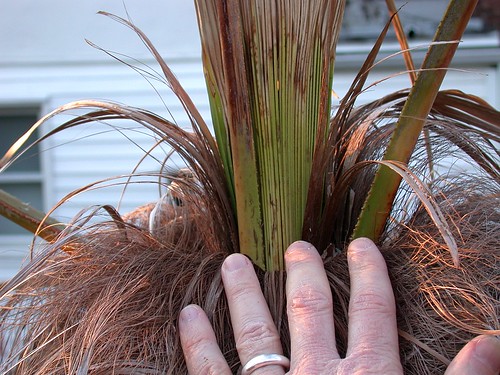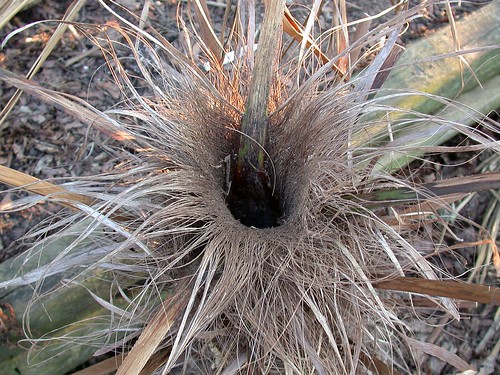
I've been trying to put together a blog post with some photos I took over a week ago, but right now I have to share this photo that I took just a couple of hours ago. A few weeks ago I asked the question, Is my palm dead? For at least one of my palms, the answer is no!
After our coldest winter in 20 years and a chilly March when it seemed spring would never come, I'm finally seeing signs of new growth on my Trachycarpus fortunei "Bulgarian". I thought I saw some green peeking out yesterday, so today I climbed up where I could get a better view and sure enough, not only has the spear not pulled, but is already pushing out new growth. This is the only one of my 3 windmill palms showing any sign of life so far. Seeds for this palm came from windmill palms cultivated in Bulgaria that are supposedly one of the hardier strains. In my experience at least, it seems to be true.
Meanwhile, here's the sad state of my waggie (Trachycarpus wagnerianus):

Yes, that's a gaping hole in the center of the trunk, where not only the spear but several leaves pulled out. I'm not holding out much hope for this one: it was the first of my windmill palms to show damage after our first "polar vortex" in early January and has virtually no green left in its leaves at all. Trachycarpus wagnerianus is often considered nothing more than a dwarf selection of T. fortunei, but reputedly hardier. My own experience does not bear this out.
My T. fortunei "Nainital"--which had been the clear winner in winters prior to this one--looks only marginally better, but I've seen windmill palms recover from devastating damage before, so I'm not going to pronounce either one dead until sometime in late summer.
One last look at the palms in early December, when the first light dusting of snow didn't seem the least bit ominous. T. fortunei "Bulgarian" is at the lower left, T. fortunei "Nainital" at upper right and T. wagnerianus next to it.


Congratulationson the survival of your T. fortunei Bulgarian! Sorry that your waggie didn't make it but it is better to have loved and lost than never to have loved at all they say.
ReplyDeleteWell, I'm not ready to pronounce anything dead quite yet! These things are surprisingly resilient. If I do lost the waggie I'll be a bit sad because I grew it from seed but it was always an experiment--a fun one but one I was willing to risk failing.
DeleteThat's good news John! Just to echo Peter, sorry to see the waggie didn't make it but well done on the Bulgarian T. fortunei! That one has proven to be a real toughie.
ReplyDeleteI'm starting to hear from other palm growers in my area and many are seeing new growth on very badly damaged palms. Unfortunately I think people with less experience may see the damage, assume the palms are dead, and remove them without giving them a chance to recover.
DeleteKeep in mind that after a cold winter it is typical for Bulgarian palms to produce female and male flowers on the same palm.So you can get fertile seed from this palm.Although,after the palm lose all of its leaves it is very recommended to cut all the flowers,so the palm use its energy for growing new leaves!
DeleteJohn, did you Waggie ever come back? That gaping hole didn't look too nice.
ReplyDelete